Top Fun Games Seniors Can Enjoy with Friends for Social and Mental Boost
Have you ever noticed how games captivate people of all ages? It’s almost like a well-kept secret that children instinctively know—but here’s the exciting part: older adults can join in on the fun too! Games for seniors are far more than just a pastime; they’re a wonderful way to ignite imagination, spark lively stories, and bring people together for some friendly competition.
Engaging in these activities offers an easy game to brighten your day while providing a fantastic boost to your brain health and social life. Whether you’re looking for a fun way to connect with family or seeking an enjoyable challenge to keep your mind sharp, there’s a game waiting for you.
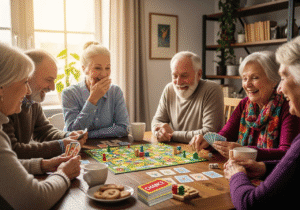
In this post, we’ll explore the best games that senior citizens can enjoy solo or with friends—perfect for those cozy indoor days or sunny afternoons outdoors. Every game is designed with simple rules and varying skill levels in mind, ensuring everyone can join in with ease and excitement.
So, gather your loved ones, get comfortable, and discover how to make your retirement not just interesting but truly entertaining. Ready to turn your free time into moments filled with laughter, connection, and joy? Let’s dive in!
General Benefits of Games for Seniors
- Cognitive Health: Regular engagement in mentally stimulating activities, such as playing games, can reduce the risk of developing Alzheimer’s disease by up to 47%. Many games can also help improve memory in seniors, supporting cognitive health as we age.
- Social Interaction: Playing games promotes social interaction, which is crucial for preventing loneliness and depression in seniors. Social engagement through these activities is essential for seniors’ well-being, as socially active seniors have a 70% lower rate of cognitive decline compared to those who are less socially active.
- Physical Health: Physical games improve mobility, balance, and overall physical fitness, reducing the risk of falls by 23%. Staying active through outdoor activities and games is especially important for seniors’ physical and mental well-being.
These benefits are especially important as we age, helping to counteract age-related decline and support overall well-being.
Best 11 Indoor Games for Seniors

1. Bingo
Bingo is the ultimate game of chance. You get your card, you’ve got numbers on it, and you’re just waiting for that magical moment when the caller shouts out the number you need. Bingo is also accessible for seniors with poor eyesight thanks to large print cards and large print materials, making it comfortable and easy to play for everyone.
It’s like a suspense thriller, but with fewer explosions and more little old ladies with lucky charms. You mark off the numbers as they’re called, and when you complete a row, you get to yell “Bingo!” and bask in the glory.
The best part? You don’t need any special skills or training. With its simple rules, Bingo is easy for everyone to play. If you can hold a marker and remember to shout, you’re in. It’s social, it’s exciting, and let’s face it, who doesn’t love the chance to win a prize, even if it’s just a box of chocolates?
Benefit: Bingo can improve cognitive function, particularly memory and alertness. Studies have shown that seniors who play Bingo have faster cognitive speeds and improved memory.
2. Scrabble
Scrabble is like a crossword puzzle where you get to make up the clues. You draw seven letters and then try to create the highest-scoring word you can.
The real fun comes when you start using those weird, little-known words that you never thought you’d have a use for. Got a Q and no U? Try “Qi.” Need to dump a bunch of vowels? “Aeon” to the rescue.
It’s a game of strategy and creativity, where you can feel like a linguistic genius for knowing that “zax” is a valid word. Plus, there’s nothing more satisfying than landing a triple-word score and watching your opponent’s face fall.
Benefit: Scrabble helps enhance vocabulary and strategic thinking. It can improve cognitive skills, with players showing better verbal skills and mental flexibility.
3. Chess
Chess is the ultimate battle of wits. You’ve got your pieces: pawns, knights, bishops, and all the rest. Each one moves in its unique way, and it’s your job to outthink your opponent and capture their king.

It’s a game of pure strategy. Every move you make opens up new possibilities and potential traps. It’s like a dance, but with more glaring and less glitter. You don’t have to be a grandmaster to enjoy it, though.
Even a beginner can appreciate the thrill of a well-planned checkmate. Plus, it’s a great way to keep your brain sharp and show off your intellectual prowess. Seniors are encouraged to play chess regularly to stimulate their minds and enjoy these cognitive benefits.
Benefit: Chess boosts problem-solving skills, memory, and cognitive abilities. It is linked to improved brain function and can delay the onset of dementia.
4. Card Games
Card games are the Swiss Army knife of indoor entertainment. You’ve got so many options: Bridge for the strategists (which is often played in teams to enhance social interaction), Poker for the bluffers, Go Fish for the grandkids.
All you need is a deck of cards and you’re set. There’s something magical about the shuffle and the deal, the feel of the cards in your hand. You can play for pennies, pride, money, or just the sheer joy of the game.
Card games can be adapted for different skill levels, making them accessible and enjoyable for everyone. Many card games are multiplayer games, which promote social engagement and connection.
Each game has its own set of rules and strategies, but they all share that same sense of camaraderie and fun. Whether you’re playing with old friends or new ones, cards are a surefire way to bring people together.
Benefits: Card games like Bridge and Poker enhance memory, strategic thinking, and social interaction. Playing Bridge has been linked to lower rates of cognitive decline .
5. Puzzle Games
Puzzles are a solo mission, but they’re also great for groups. You dump out the pieces, and you’ve got this giant mess that somehow, some way, is going to turn into a beautiful picture. Puzzles come in a variety of themes, such as nature, gardens, or familiar imagery, to suit different interests. Many puzzles are also available in large print versions, making them accessible and comfortable for those with visual impairments. Puzzles are a type of brain games, which include a range of activities designed to stimulate mental faculties.
It’s like magic but with more squinting and less wand-waving. Each piece is a tiny part of the whole, and finding where it fits is so satisfying. You can tackle a puzzle over days or weeks, popping in a piece here and there.
It’s calming, it’s challenging, and when you finally snap that last piece into place, it’s like finishing a marathon. Only you can do it in your pajamas, with a cup of tea.
Benefits: Regularly completing puzzles can improve visual-spatial reasoning, short-term memory, and problem-solving skills. Puzzles can also help improve memory in seniors, offering cognitive benefits alongside entertainment. It has been found that engaging in puzzles can increase brain function by up to 30%.
6. Dominoes
Dominoes isn’t just about lining them up and knocking them over, although that’s a lot of fun too. As one of the classic games enjoyed by generations, dominoes features simple rules that make it easy to learn and accessible for everyone. The real game is a strategic match where you’re trying to get rid of all your tiles by matching numbers.
You lay down a double-six and the game is on. Your opponent matches with a six-five, and it’s a race to see who can empty their hand first.
It’s simple, but it gets your brain working. Plus, there’s something so satisfying about the click-clack of the tiles as you play. It’s like ASMR for gamers.
Benefits: Dominoes help improve math skills, memory, and strategic thinking. The game requires players to recognize patterns and think ahead, providing excellent mental exercise.
7. Mah Jongg
Mah Jongg is a bit like rummy but with tiles instead of cards. You’ve got these beautiful, engraved tiles, and you’re trying to form sets and runs.
Mah Jongg is a classic multiplayer game, typically played with four people, which encourages social interaction and camaraderie. It’s a great choice for seniors seeking a challenging and social activity.
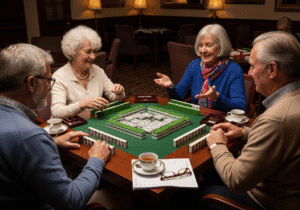
The game is a blend of luck and strategy, with a dash of memory thrown in. You pick a tile, discard a tile, and hope that you’re not setting up your opponent for a win.
It’s a game that’s easy to learn but hard to master, which makes it endlessly fascinating. Plus, it’s got that great clattering sound as you shuffle the tiles.
Benefits: Mah Jongg is a complex game that requires strategic thinking, memory, and concentration. Regular play can enhance cognitive function and delay cognitive decline.
8. Rummikub
Rummikub is a numbers game where you’re trying to form runs and sets. You start with 14 tiles and a head full of dreams. You lay down your tiles in groups of three or more, trying to clear your rack before anyone else. Rummikub fosters friendly competition among players, making it a great choice for social gatherings. For added fun and collaboration, Rummikub can also be played in teams, encouraging everyone to work together and stay engaged.
It’s fast-paced and fun, with a lot of strategy involved. You can rearrange the tiles on the table, making new sets and runs as you go. It’s like a puzzle that’s always changing.
Plus, there’s that moment of triumph when you go out and everyone else has to add up their leftover tiles.
Benefits: Rummikub combines elements of rummy and mahjong, promoting strategic thinking and planning. It helps improve cognitive abilities and can slow down cognitive decline.
9. Checkers
Checkers is a game of simple moves, simple rules, and complex strategies. You move your pieces diagonally, trying to jump over and capture your opponent’s pieces.
The goal is to reach the other side of the board and get your pieces kinged, giving them the power to move backwards. It’s a game that’s easy to learn thanks to its simple rules, but can take a lifetime to master.
There’s nothing like the thrill of planning a multi-jump move and watching your opponent’s face as you clear their pieces from the board. Plus, it’s a game that can be played at any pace, making it perfect for a relaxed afternoon.
Benefits: Checkers helps improve problem-solving skills and strategic thinking. It stimulates the brain and enhances cognitive function, which can help delay the onset of cognitive decline and dementia.
10. Backgammon
Backgammon is one of the oldest board games around, and it’s still just as much fun as it was thousands of years ago. As one of the classic games enjoyed by many, Backgammon stands out for its timeless appeal. It’s a great game for seniors, offering simple gameplay, social interaction, and cognitive benefits. You’ve got your pieces, you’ve got your dice, and you’re trying to move all your pieces off the board before your opponent does.
It’s a game of strategy and luck, with plenty of opportunities for bold moves and clever traps. You can block your opponent, hit their pieces, and race for the finish line.
It’s a game that combines the thrill of competition with the joy of a well-rolled double-six.
Benefits: Backgammon requires strategic thinking, planning, and probability assessment. Playing regularly can improve cognitive abilities and delay cognitive decline.
11. Sudoku
Sudoku isn’t a traditional board game, but it’s perfect for a quiet afternoon. You’ve got a grid of numbers, and your job is to fill in the blanks so that every row, column, and box contains the numbers 1 through 9. Many Sudoku puzzles are available for free online, making them accessible to everyone.
Sudoku is one of the most popular brain games for seniors. It’s a game of logic and patience, where every number you place can help you solve the puzzle. It’s challenging but rewarding, and there’s nothing like the feeling of completing a tricky puzzle.
Plus, it’s a great way to keep your brain sharp and focused.
Benefits: Sudoku puzzles are excellent for improving logical thinking and problem-solving skills. They stimulate the brain and enhance cognitive function, which can delay cognitive decline.
Impact on Health and Mindset
- Cognitive Stimulation: Regular engagement in mentally stimulating activities, such as playing games, reduces the risk of cognitive decline and dementia by up to 47%. Many games can also improve memory, helping seniors maintain and enhance their cognitive abilities.
- Social Interaction: Socially active seniors have a 70% lower rate of cognitive decline compared to those who are less socially active. Playing games in groups fosters social connections, which are essential for emotional well-being. Social engagement is a key benefit of group games, promoting interaction and mental stimulation among seniors.
- Stress Reduction: Participating in enjoyable activities like games can significantly reduce stress levels and improve mood. The release of endorphins during these activities promotes a sense of happiness and relaxation. Playing games also helps seniors stay engaged both mentally and socially.
- Improved Quality of Life: Regular participation in games contributes to a higher quality of life by enhancing physical health, cognitive function, and emotional well-being. Seniors who engage in social and mental activities regularly report higher levels of satisfaction and happiness. Games also foster a sense of community among seniors, encouraging shared experiences and a sense of belonging.
Best 11 Outdoor Games for Seniors
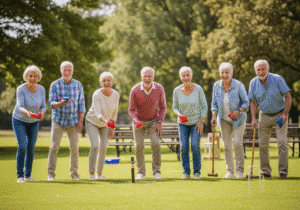
1. Bocce Ball
Bocce Ball is like bowling, but on grass. You’ve got these big, colorful balls, and you’re trying to get them as close as possible to a smaller ball called the pallino.
It’s a game of skill and precision, with a little bit of luck thrown in. You can play it on the lawn, at the park, or even on the beach. Bocce Ball is often played in teams, which enhances social interaction and makes the game more engaging for everyone. It also provides light exercise suitable for all ages, making it accessible and enjoyable for family gatherings or groups of friends. The best part? You don’t have to be an athlete to enjoy it.
It’s all about the technique and a steady hand. Plus, it’s a great way to spend a sunny afternoon with friends.
Benefits: Bocce Ball encourages physical activity and social interaction. Playing bocce can improve hand-eye coordination and balance, reducing the risk of falls. Additionally, outdoor activity has been shown to improve mood and reduce stress.
2. Croquet
Croquet is the quintessential garden game. You’ve got mallets, hoops, and balls, and the goal is to hit your ball through the hoops in the right order.
It’s a game of strategy and skill, where you can knock your opponent’s ball out of the way or set up a perfect shot. Croquet is often played as a friendly competition, encouraging social interaction and making it enjoyable for everyone. The game can be easily adapted for different skill levels, so participants of all abilities can join in. You can play it on any lawn, and it’s a great excuse to spend some time outdoors.
Plus, something is charming about the click of the mallet hitting the ball and the satisfaction of making it through the hoop.
Benefits: Croquet is a gentle physical activity that promotes balance, coordination, and social interaction. It can help improve motor skills and provide a low-impact form of exercise that’s easy on the joints.
3. Horseshoes
Horseshoes is a game of aim and accuracy. You’ve got metal horseshoes, and you’re trying to toss them onto a stake in the ground. Players score a point by landing a horseshoe on the stake or getting it closest to the stake.
It’s simple, but it takes a bit of practice to get the hang of it. The game can be as competitive or as relaxed as you want it to be. You can play it at the park, in your backyard, or at a picnic.
It’s a great way to enjoy the outdoors and get a bit of light exercise, all while having fun with friends.
Benefits: Playing horseshoes can improve upper body strength, hand-eye coordination, and balance. It’s a fun way to get some physical activity while enjoying the outdoors.
4. Lawn Bowling
Lawn Bowling is like regular bowling but with a twist. You’ve got these weighted balls that curve as they roll, and you’re trying to get them as close as possible to a smaller ball called the jack. Each person takes turns rolling the ball, making it engaging for everyone involved. Lawn Bowling can also be played in teams for added fun and social interaction.
It’s a game of strategy and finesse, where every roll counts. You can play it on a grassy lawn or a specially designed-bowling green.
It’s a game that’s easy to learn but hard to master, and it’s a great way to spend time outdoors.
Benefits: Lawn bowling helps improve balance, coordination, and concentration. It’s a social activity that can enhance mental well-being and provide gentle physical exercise.
5. Shuffleboard
Shuffleboard is a game of skill and precision. You’ve got a long, smooth court and disks that you push with a long stick called a cue.
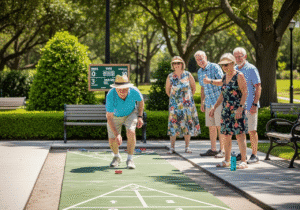
The goal is to slide your disks into the scoring area at the other end of the court while knocking your opponent’s disks out of the way. Shuffleboard is often enjoyed as a friendly competition, encouraging social interaction and making it a fun, inclusive activity for everyone.
It’s a game that’s easy to pick up but takes practice to get good at. You can play it on a cruise ship, at the park, or even on a specially designed-court in your backyard.
Benefits: Shuffleboard promotes balance, coordination, and strategic thinking. Playing shuffleboard regularly can help maintain muscle strength and improve social connections.
6. Badminton
Badminton is a fast-paced, fun game that’s great for getting a bit of exercise. You’ve got a racket and a shuttlecock, and you’re trying to hit the shuttlecock over a net and into your opponent’s court.
It’s a game of speed and precision, where you can have long rallies and exciting volleys. You can play it in your backyard, at the park, or even on the beach. Badminton is a great choice for seniors looking for a fun and active game, and it can be played at different skill levels, making it accessible for everyone.
It’s a great way to stay active and have a lot of fun with friends.
Benefits: Badminton is a fast-paced game that improves cardiovascular health, coordination, and reflexes. It provides a good aerobic workout and can enhance overall fitness and mental sharpness.
7. Frisbee Golf
Frisbee Golf is like regular golf, but with a Frisbee. You’ve got a course with targets, and the goal is to throw your Frisbee into the targets with as few throws as possible. The main point of the game is to reach the target (or point) in as few throws as possible.
It’s a game of skill and strategy, where you can take different routes to reach the target. You can play it at the park, in your backyard, or even at a specially designed Frisbee golf course.
It’s a great way to enjoy the outdoors and get a bit of light exercise, especially for seniors.
Benefits: Frisbee golf combines the benefits of walking with the strategic elements of golf. It improves cardiovascular health, coordination, and mental focus. Playing frisbee golf can also help reduce stress and improve mood.
8. Bean Bag Toss (Cornhole)
Bean Bag Toss, also known as Cornhole, is a simple yet addictive game and is considered one of the popular games for seniors. You’ve got two boards with holes in them and a bunch of bean bags.
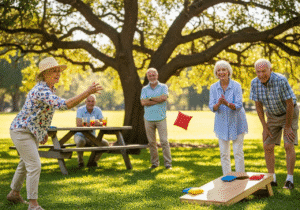
The goal is to toss the bean bags into the holes from a distance. It’s a game of aim and accuracy, where you can score points by getting the bags through the hole or onto the board. The simple rules make it easy for everyone to learn and play, regardless of age or skill level.
You can play it at picnics, tailgate parties, or in your backyard. It’s easy to set up and a lot of fun for all ages.
9. Pickleball
Pickleball is a mix of tennis, badminton, and ping pong. You’ve got a paddle and a plastic ball with holes in it, and you’re trying to hit the ball over a net and into your opponent’s court.
It’s a game of speed and skill, where you can have fast-paced rallies and exciting volleys.
Pickleball is a multiplayer game, often played in doubles, which encourages social interaction and camaraderie. You can play it on a tennis court, at the park, or even in your backyard. It’s a great way for seniors to focus on staying active and have a lot of fun.
Benefits: Pickleball is an excellent cardiovascular workout that improves balance, agility, and hand-eye coordination. It’s a popular sport among seniors because it’s easy to learn and provides both physical and mental benefits.
10. Bocce Darts
Bocce Darts combines the fun of bocce ball with the precision of darts. You’ve got a target board and soft-tipped darts, and the goal is to throw the darts onto the target and score points.
It’s a game of aim and accuracy, where you can compete with friends or play in teams for added fun. Players always have a great time competing to see who has the best throwing arm. You can play it at picnics, tailgate parties, or in your backyard.
It’s easy to set up and a lot of fun for all ages.
Benefits: Bocce darts combines the precision of darts with the social aspect of bocce. It improves hand-eye coordination and provides a fun way to engage in physical activity with friends.
11. Ring Toss
Ring Toss is a classic game of aim and skill. You’ve got a set of rings and a target with pegs, and the goal is to toss the rings onto the pegs and score points. As one of the most popular party games for seniors, Ring Toss stands out for its simple rules, making it easy for everyone to join in and enjoy.
It’s a simple game, but it takes practice to get good at it. You can play it at picnics, tailgate parties, or in your backyard.
It’s easy to set up and a lot of fun for all ages.
Benefits: Ring toss improves hand-eye coordination and concentration. It’s a simple yet engaging activity that can be enjoyed by people of all ages and fitness levels.
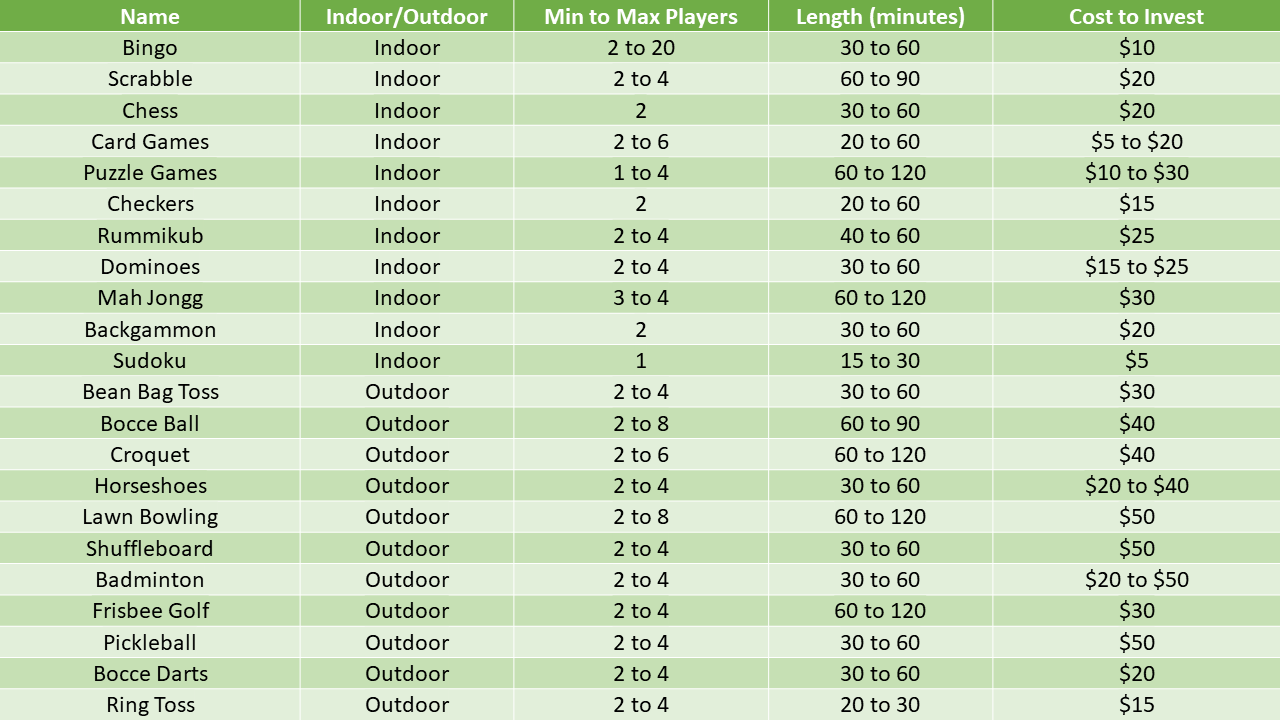
So, there you have it. Games for seniors aren’t just about killing time. They’re like secret weapons for staying sharp, active, and happy.
Whether you’re into Bingo, Scrabble, or a good game of Bocce Ball, there’s something out there for everyone. It’s not just about winning; it’s about having fun, making friends, and keeping the mind and body in shape.
You can gather around a table or head to the park. It doesn’t matter. The important thing is to keep playing, keep laughing, and keep enjoying life.
So, grab a deck of cards, set up the croquet, or get that Sudoku book out.
Let the games begin!
